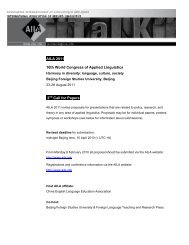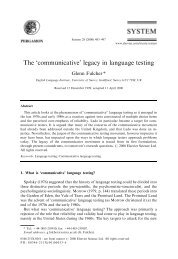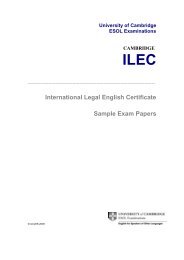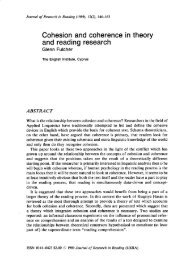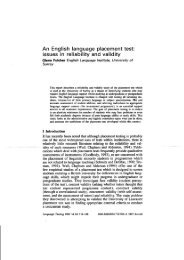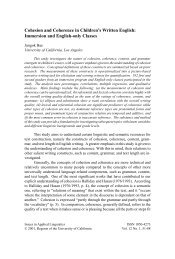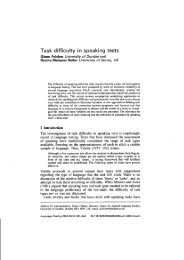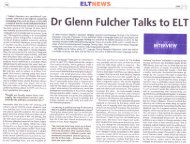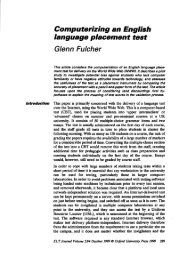Liaison Magazine - LLAS Centre for Languages, Linguistics and ...
Liaison Magazine - LLAS Centre for Languages, Linguistics and ...
Liaison Magazine - LLAS Centre for Languages, Linguistics and ...
Create successful ePaper yourself
Turn your PDF publications into a flip-book with our unique Google optimized e-Paper software.
viewpoint<br />
rein<strong>for</strong>ced by the production of a<br />
manual to guide researchers to do this.<br />
The conclusion that a test specification<br />
will contain only a small part of a<br />
model (or under-represents the<br />
model) is as inevitable as the<br />
conclusion that the model does not<br />
contain the detail that is needed <strong>for</strong> an<br />
operational test specification.The two<br />
documents are at different levels of<br />
the architectural test documentation<br />
<strong>and</strong> cannot be compared.The<br />
illogicality of this position is made clear<br />
in Kaft<strong>and</strong>jieva (2007: 35), which<br />
argues validity is a question of<br />
alignment, <strong>and</strong> that “the main goal of<br />
this linking exercise is to demonstrate<br />
compliance with a m<strong>and</strong>ate”. Indeed.<br />
When we are told to align our<br />
teaching or assessment with a<br />
st<strong>and</strong>ards-based system, we are taking<br />
the first step in compliance with a<br />
system that will increasingly encroach<br />
on our liberty to teach <strong>and</strong> assess in<br />
ways that are ecologically sensitive to<br />
our particular learning environments<br />
<strong>and</strong> educational goals.<br />
In her analysis of a reading test,<br />
Kaft<strong>and</strong>jieva discovers that the match<br />
between the test <strong>and</strong> the CEFR<br />
reading descriptors is approximately<br />
27%, which is accounted <strong>for</strong> by the<br />
suggestion that the CEFR descriptors<br />
are very general, <strong>and</strong> that the test is<br />
not long enough.The author argues<br />
that linkage can be improved “simply<br />
by adding a few more items based on<br />
short texts whose discourse type is<br />
expository, argumentative or<br />
instructive” (40) <strong>and</strong> by combining<br />
categories in the CEFR that judges<br />
cannot agree upon, such as “make<br />
straight<strong>for</strong>ward inferences” <strong>and</strong><br />
“interpret <strong>and</strong> integrate ideas <strong>and</strong><br />
in<strong>for</strong>mation”.<br />
This advice is not burdened at all<br />
with any concern that the machinery<br />
of alignment ignores the context of<br />
language use, the purpose of<br />
assessment, <strong>and</strong> the concept of validity<br />
as making sound inferences <strong>and</strong> claims.<br />
Context <strong>and</strong> complexity, individual<br />
needs <strong>and</strong> communicative purpose,<br />
are far too messy <strong>for</strong> the world of<br />
alignment <strong>and</strong> accountability. One<br />
system is needed to classify everyone.<br />
But as Krumm (2007: 667) puts it:<br />
[…] in a world of social, cultural, <strong>and</strong><br />
individual heterogeneity, one instrument<br />
<strong>and</strong> approach can neither address all<br />
situations <strong>and</strong> contexts nor meet all<br />
needs.Although the CEFR is not intended<br />
to be applied uni<strong>for</strong>mly to everybody, in<br />
some cases it is applied in just such a<br />
fashion […]<br />
Conclusion<br />
Testing <strong>and</strong> assessment can have a<br />
useful place in language learning <strong>and</strong><br />
teaching. However, st<strong>and</strong>ards-based<br />
assessment is the result of a<br />
breakdown in trust between the<br />
bureaucracy <strong>and</strong> language educators.<br />
We are perceived as being traditional,<br />
of avoiding change to our com<strong>for</strong>table<br />
lives.We are seen as putting the<br />
economy <strong>and</strong> our rank in the<br />
globalised market place in jeopardy.<br />
Boyle (2000: 47) lists this as one of his<br />
paradoxes:“Numbers replace trust,<br />
but make measuring even more<br />
untrustworthy.” First, st<strong>and</strong>ards-based<br />
assessment creates an accountability<br />
system where the statistics,<br />
comparisons <strong>and</strong> league tables tell the<br />
truth about per<strong>for</strong>mance. Poor<br />
per<strong>for</strong>mance can be policed, <strong>and</strong> can<br />
result in severe penalties.Yet, what is<br />
being measured is not always what is<br />
important; this in itself is a value<br />
judgment, which is inherently<br />
theoretical <strong>and</strong> political. Second,<br />
accountability always has unintended<br />
consequences. In secondary education,<br />
meeting st<strong>and</strong>ards is now more<br />
important than learning, leading to the<br />
kinds of bizarre practices in language<br />
teaching described by Mansell (2007:<br />
83-90).<br />
Aligning our teaching <strong>and</strong><br />
assessment practices to the CEFR is<br />
not an ideologically or politically<br />
neutral act. And the consequences<br />
should not be underestimated. It<br />
would be the first step toward the<br />
external control <strong>and</strong> monitoring of<br />
content <strong>and</strong> outcomes in language<br />
education. Do we believe that the<br />
st<strong>and</strong>ardised outputs of centrally<br />
controlled st<strong>and</strong>ards-based language<br />
education will serve the primary<br />
economic needs of a superstate,<br />
competing <strong>for</strong> its place in the global<br />
economy As Kelly (2004: 1) writes:<br />
Higher education provides a<br />
microcosm of the broader picture as<br />
Europe attempts to respond to global<br />
changes by creating a European Higher<br />
Education Area, capable of matching the<br />
US <strong>and</strong> Japan by 2010.That is a tall<br />
order <strong>and</strong>, as the EU Commission has<br />
warned, unlikely to be met without<br />
urgent re<strong>for</strong>ms. In response, the package<br />
of changes known as the Bologna<br />
Process is likely to be accelerated, with<br />
resulting opportunities <strong>and</strong> threats.<br />
Or with von Humboldt (1854: 48), do<br />
we believe that language education is<br />
primarily about “the absolute <strong>and</strong><br />
essential importance of human<br />
development in its richest diversity”,<br />
which provides a sounder basis <strong>for</strong><br />
success than the perceived needs of<br />
the collective<br />
These are far from being trivial<br />
questions. How we address them<br />
within our institutions, <strong>and</strong> the<br />
decisions we make, will affect language<br />
education well into the new century.<br />
Dr Glenn Fulcher is a Senior Lecturer<br />
in Education (Applied <strong>Linguistics</strong>) at<br />
the University of Leicester.<br />
<strong>Liaison</strong> magazine • llas.ac.uk •23



